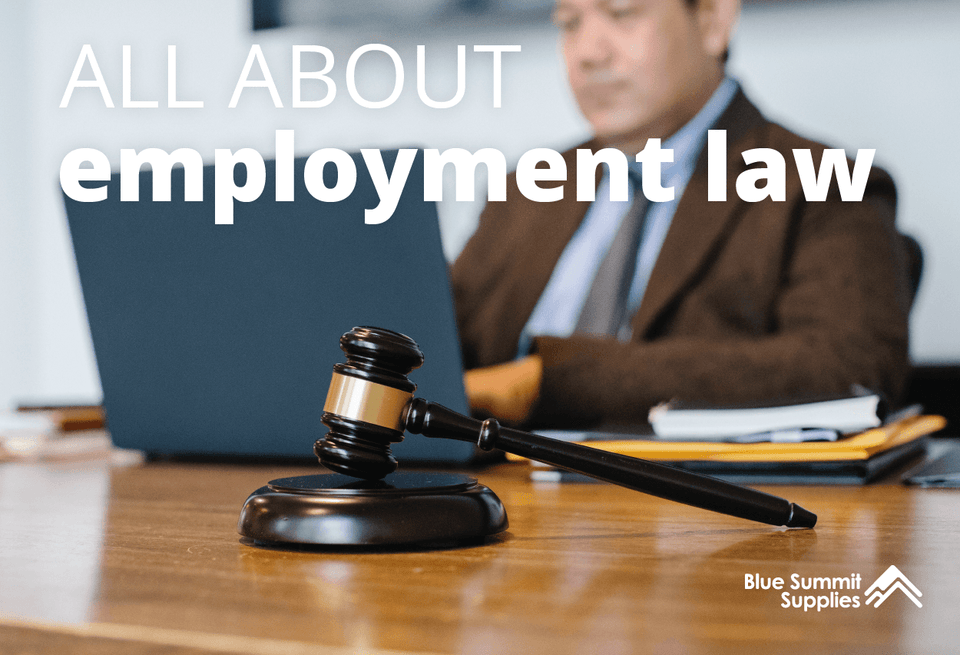Do you know your rights as an employee? Both public and private sector employees have quite a few rights in the US across federal, state, and local levels of government, but labor & employment law is a complicated topic. Because of this, employment law can be a difficult thing to navigate on your own. How do you know if your rights are being violated, and what can you do about it?
Learn all about employment law, including what employment law lawyers do, reasons why you might need to hire an attorney, the different government acts created to protect the rights of employees, and how you can find employment law help.
What Do Employment Law Lawyers Do?
An employment lawyer is a lawyer who specializes in helping clients interpret and litigate legal issues related to work. Employment lawyers can choose to work with both employees and employers, or they can choose to work with employees or employers exclusively.
There are a plethora of different federal, state, and local employment laws designed to ensure employees are always treated fairly, and there’s also a very wide variety of issues that can come up in a workplace. Because of the wide range of issues and multitude of different employment laws, many employment lawyers typically specialize in just a few areas.
Employment lawyers advise employees on a range of different work-related issues:
- Termination of employment
- Workers’ compensation
- Wage and overtime standards
- Privacy rights
- Employment benefits (retirement plans, paid time off)
- Workplace safety
- Sexual harassment
- Discrimination against employees based on race, religion, sexual orientation, age, gender, ancestry, disability, medical conditions, marital status, and more.
Employment lawyers mediate between employees and employers, advise clients about their employment rights and recommend legal action, review employment contracts, handle legal matters that involve collective bargaining, and represent clients in court in civil lawsuits against employers.
Employment lawyers who work for employers typically provide preventive lawyering, which means helping employers to create workplace policies and processes that are in compliance with federal, state, and local employment laws. This helps minimize potential conflict between employers and employees. Employment lawyers can also represent employers in state and federal courts and in front of government administrative boards.

Reasons You Might Need an Employment Law Attorney
There are a number of different reasons why you might need an employment law attorney, but first, let’s break down the difference between a lawyer and an attorney.
A lawyer is someone who has been to law school and taken the bar exam; they are qualified to give legal advice, but they may not necessarily practice law in a courtroom. An attorney or attorney-at-law is a lawyer who practices law in a courtroom by prosecuting the accused or by defending a client. So while both terms are used interchangeably in the US, technically, an attorney is a lawyer, but a lawyer may not necessarily be an attorney.
If you need a lawyer to advise you of and defend your rights in a courtroom, you’ll be looking for an employment law attorney.
Employment law is complicated and convoluted. There are tons of different employment laws spread across federal, state, and local levels—so many that an employer can easily violate one either willfully or ignorantly. There are also different count and tenure thresholds for different laws. If you feel as though your rights are being violated or you’re being discriminated against in any way, it’s important to seek out the advice of an employment law attorney.
If you have brought your issue or concern to your employer and they haven’t offered an acceptable remedy to the situation, it’s likely time to contact an attorney. You may also choose to go directly to the federal Equal Employment Opportunity Commission (EEOC) or state equivalent if you believe you’ve been discriminated against, but these agencies generally do not perform exhaustive investigations, and the US Department of Justice rarely decides to take a case.
Although the EEOC was specifically created to investigate workers’ claims of discrimination, employees still face an uphill battle because their employer likely has more resources and expertise they can utilize in a courtroom setting. If you feel like you are being discriminated against, it’s important to seek help from a professional with your best interests at heart.
Reasons you might need an employment law attorney:
- You believe your termination was illegal.
- You believe your termination could be based on your race, religion, sexual orientation, age, gender, ancestry, disability, medical conditions, marital status, and so on.
- You have evidence that your termination was illegal.
- You are uncertain of your rights after you are terminated.
- You are considering quitting your job because of your employer’s unlawful conduct.
- You believe you have been denied a promotion or raise due to discriminatory circumstances based on race, religion, sexual orientation, age, gender, ancestry, disability, medical conditions, marital status, and so on.
- You need help negotiating severance pay.
- You know of many coworkers who feel the same way as you and want to bring the same claim to your employer.
- You want to file a lawsuit in state or federal court against your employer.
📚 While discrimination issues related to race, gender, and sexual orientation often take the spotlight, workplace discrimination based on an employee’s age is also prevalent. Learn more about Ageism at Work and How to Manage Generational Differences in the Workplace.
Employment Law Advice: Understanding Employee Rights
What is the FLSA (Fair Labor Standards Act)?
The Fair Labor Standards Act (FLSA) establishes the minimum wage, overtime pay, recordkeeping, and youth employment standards that affect employees in federal, state, and local governments as well as in the private sector. The FLSA states that covered nonexempt workers are entitled to a minimum wage of $7.25 per hour. Since many states also have minimum wage laws, if an employee is subject to both state and federal minimum wage laws, the employee is entitled to the higher minimum wage.
Overtime pay is required after 40 hours of work in a workweek (seven consecutive 24-hour periods) at a rate not less than one and one-half times the regular rate of pay. There is no limit to the number of hours an employee over the age of 16 can work during a standard workweek. The FLSA doesn’t require overtime pay on weekends or holidays unless overtime is worked on those days.
Employers must display an official poster outlining the requirements of the FLSA, and they must keep employee time and pay records.
What is the OSH (Occupational Safety and Health Act)?
The Occupational Safety and Health Act of 1970 is a US law that establishes workplace standards to ensure employees are always protected from workplace hazards that could affect their health and safety.
The OSH applies to most private sector employers and employees as well as some in the public sector. It established the Occupational Health and Safety Administration (OSHA) and the National Institute for Occupational Safety and Health (NIOSH). The OSHA is the enforcement arm of the act, which means it is responsible for applying fines and penalties to employers who violate the act. The NIOSH is responsible for performing research and making recommendations for the prevention of work-related injuries and illnesses.
What is the FMLA (Family and Medical Leave Act)?
The Family and Medical Leave Act (FMLA) authorizes eligible employees of covered employers to take 12 weeks of unpaid, job-protected leave every year for specified family and medical reasons with continuation of health benefits.
The FMLA is a government provision that is required of all schools, public agencies (including local, state, and federal employers), and private sector employers who employ 50 or more employees for at least 20 workweeks in the current or preceding calendar year. This includes joint employers and successors of covered employers.
📚Learn more in our guide: FMLA vs. Short-Term Disability: What's the Difference?
What is the ADA (Americans with Disabilities Act)?
The Americans with Disabilities Act (ADA) forbids discrimination against people with disabilities in several areas, including employment, public accommodations, communications, transportation, and access to state and local government programs and services. Title 1 of the ADA protects both employees and people looking for a job.
What is the ADEA (Age Discrimination in Employment Act)?
The Age Discrimination in Employment Act (ADEA) is a federal law that prohibits discrimination against employees and applicants age 40 or older. The law seeks to encourage employers to judge an employee or potential employee in terms of their ability rather than their age and to prohibit arbitrary age discrimination in employment. The act aims to help employers and employees find constructive ways of dealing with the problems that can arise from the impact of age on employment.
What is the FECA (Federal Employees' Compensation Act)?
The Federal Employees’ Compensation Act (FECA) provides coverage to federal civilian employees who have suffered work-related injuries or illnesses by delivering medical and monetary benefits and helping employees return to work when they are medically able to do so. Monetary benefits include compensation for lost wages as well as permanent impairment.
📚 Learn more about other Major US Laws of the Department of Labor.
Finding Employment Law Help
When searching for top employment law firms, it’s always best to check with the people you know and trust first. Ask your family members, friends, and friends of friends if they know of any reputable employment lawyers or law offices. Reach out on your social media circles, and consider the reviews and testimonials of people who have been represented by the law office.
Once you have a few recommendations, call to check for availability, pricing, and if your values and goals align with those of the law firm.
Recommendations are always best, but failing that, you can do a quick Google search for employment law firms near me or an employment law attorney near me. While there is a technical difference between attorneys and lawyers, as stated above, the terms are used interchangeably in the US.

Double-check which services are offered and what type of employment law the firm specializes in. Do you need a federal employment law attorney, or is your issue at a state or local level? How are you being discriminated against? Is the discrimination based on your race, your age, or a disability? Do your research to ensure you find an employment law attorney who specializes in the specific legal issues you’re facing as an employee.
There are a number of different employment laws spread across federal, state, and local levels of government, and even more ways your rights as an employee can be violated. If you believe you’re being discriminated against by your employer for any reason, it’s important to seek the advice of a reputable employment law attorney.
Learn more: Discrimination at Work: Signs You Need a Workplace Discrimination Attorney.
Our office supplies blog is dedicated to workplace wellness. Follow Blue Summit Supplies for the latest career advice, industry trends, office strategies, and more.
If you have any questions or want to talk to us about office supplies, connect with us on Twitter, Facebook, or Instagram.
 For more informative articles about office supplies, subscribe to our email newsletter!
For more informative articles about office supplies, subscribe to our email newsletter!
Never fear, you won't begin receiving daily sales emails that belong in a spam folder. Instead, we promise a fun weekly roundup of our latest blog posts and great finds from across the web. And if you lose interest, it's always easy to unsubscribe with a single click.
















